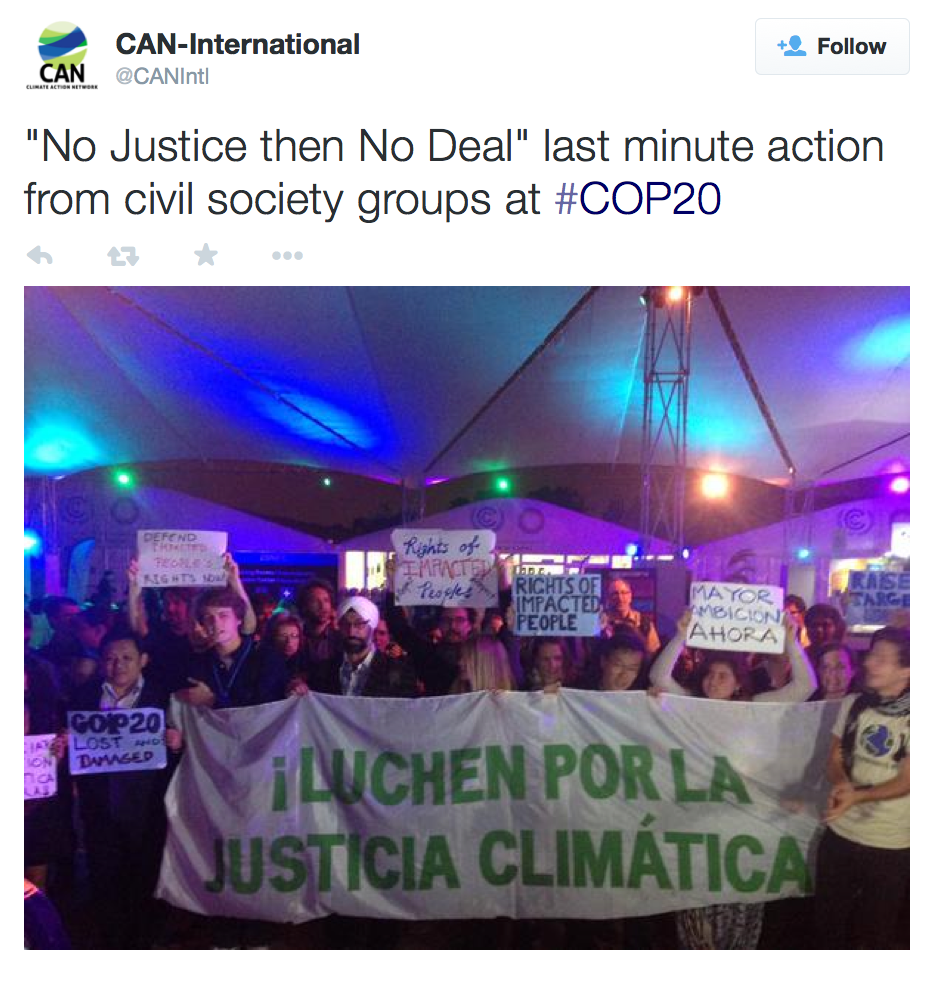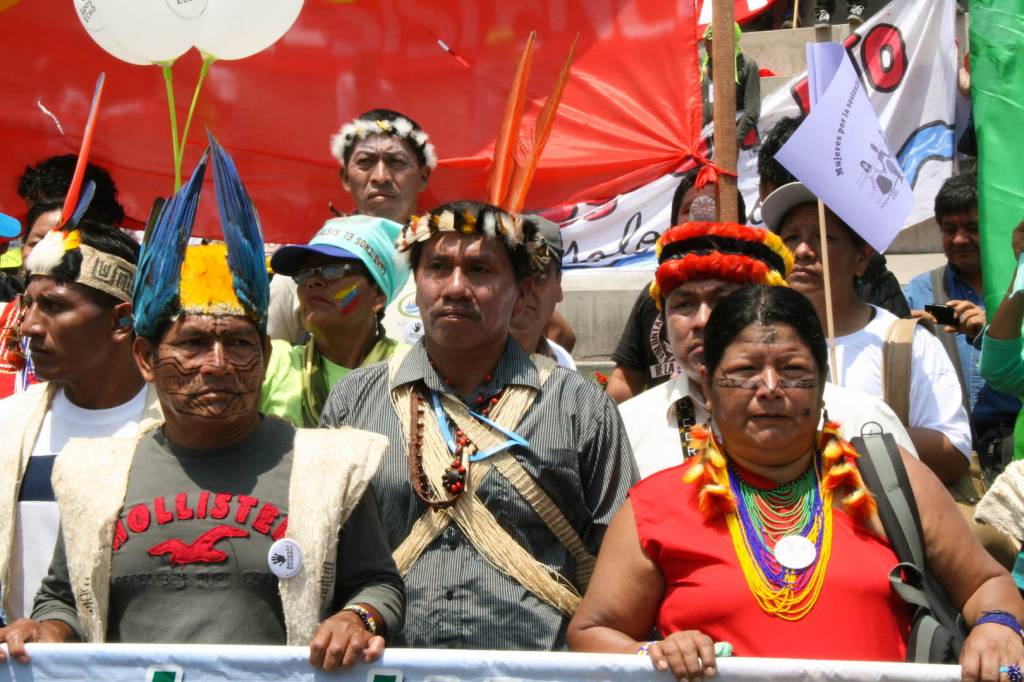The latest round of climate talks just concluded in Lima, Peru after two tense days of overtime negotiations. The talks produced a new document, the Lima Call for Climate Action, that sets up the framework for negotiations on a new climate treaty that will be decided in Paris next year. Overall, however, the talks were a disappointment. Politicians failed to build on the momentum created by the climate movement, through events like the People’s Climate March, and kicked many of the big debates down the road. If we’re going to get a successful outcome in Paris – one that could be a real stepping stone in reducing emissions and building international solutions to combat the climate crisis – then negotiators, and our movement are going to have to step things up a notch.
Here are 5 outcomes that can help you understand what’s going on:
1. The new agreement does not reflect the urgency of the climate crisis.
Filipino activist Lidy Nacpil (and 350.org board member) said one of the “fundamental flaws” of the negotiations is “the lack of a clear global goal for limiting global warming based on science.” The world’s scientists in the latest IPCC report made it clear that we have to get off fossil fuels and take urgent measures if we want to keep warming to 2 degrees Celsius and avert global disaster.
However – this new agreement just won’t get us there.
“We are on a path to three or four degrees with this outcome”
—Tasneem Essop, international climate strategist for WWF.
It also doesn’t address the urgency that communities around the world face.
“No national leader in the history of humanity has ever faced this question: ‘Will we survive or will we disappear under the sea?’” – Tuvalu Prime Minister Enele Sopoaga said at the talks.
Mohamed Adow from Christian Aid lays it out clearly in this interview:
2. Some good agreements – but no measures to ensure implementation
One of the scenarios included in the text coming out of Lima is a goal of phasing out carbon emissions by mid-century, which was supported by over 100 countries. The fact this made it out of Lima is huge. The only way to achieve this scenario is by moving away from fossil fuels, so this pits the UNFCCC process directly against the fossil fuel industry.
The Lima Accord was different from other negotiations, because for the first time all nations agreed to cut carbon emissions. Each country will report in the coming months how they will make this happen. However, there’s a key word switch in the text that has massive consequences (or incidentally lack of consequences). The text was changed from “shall” to “may” in regards to international oversight of carbon emissions reductions plans. Nations won’t be held accountable for reporting their plans – it’s as if each country “will be marking their own homework ahead of the critical Paris meeting.”
It will take a lot of global pressure is year to ensure that government’s take reasonable measures.
Or as the Foreign Minister of the Marshall Islands (one of the nations most at risk from climate change) says:

3. Least developed and vulnerable nations left out in the cold
The agreement is also a major missed opportunity for rich nations to support countries that are being the most impacted by climate change. Now countries that have had little impact on global emissions will likely be the ones making the most efforts to create change — and they will not be getting enough support. In short – it could very well be a travesty for climate justice.
Brandon Wu at ActionAid USA laid out the problems:
“We wanted three primary things from Lima: clear indications of how developed countries would scale up climate finance leading up to the promised $100bn per year in 2020; assurance that “loss and damage” would be a core pillar of the new climate regime to be decided in 2015; and concrete commitments to reduce emissions in the immediate short term (pre-2020). Lima delivered none of these things.

4. Divestment is more important than ever
What was discussed a lot at the talks was the need to finally get off of fossil fuels. Everyone from Leonardo DiCaprio to a global group of Catholic bishops were talking about the need for a global energy shift. And even though fossil fuel companies like to dismiss the divestment movement “some nervous actions” at the talks show “more concern than they let on.”
We were pleased to see around 100 countries support the goal of phasing out carbon emissions by mid-century. The goal’s inclusion in the draft text is a win for the fossil fuel divestment movement and will add momentum to that growing campaign. But action must begin now, not after decades of delay. Which is why we need to get companies to divest now.
Financially, ethically, politically – the world is waking up to the reality that business as usual can’t go on.

Watch 350’s Jamie Henn discuss with Democracy Now’s Amy Goodman about fossil fuel divestment and the climate talks:
5. Global momentum for real solutions is stronger than ever and will keep on going.
There were enormous moments of people power the past 2 weeks — the global movement for real climate solutions is stronger than ever. Over the past year, hundreds of thousands of people have taken to the streets to demand climate action–millions more will join them in the year ahead. Politicians can either ride that wave, or be swept away by it. It’s up to all of us to lead the way on action.
Filipino climate activist Yeb Sano said it well:

On December 10th, tens of thousands of people took to the streets of Lima — carrying on the beautiful, big energy from the People’s Climate March that started in September and adding to it in a powerful way. Activists, artists, indigenous communities were there – chanting loudly their demands for climate justice and real solutions . The climate movement in Latin America is vibrantly alive, and there is a lot the global climate movement can learn.


Indigenous communities at the forefront of the climate crisis led the march in Lima. Photo credit: Hoda Baraka
Here is some aerial footage of the march — this march was big!
In the end, a global climate treaty is just one tool to combat climate change. Real change is going to continue to come from the grassroots. The UN Climate Talks continue to be a place where the world’s countries comes together to debate this crisis and people are putting in enormous efforts to make sure Paris won’t be like Copenhagen.
Read 350’s statement: UN climate talks reflect disconnect with global momentum